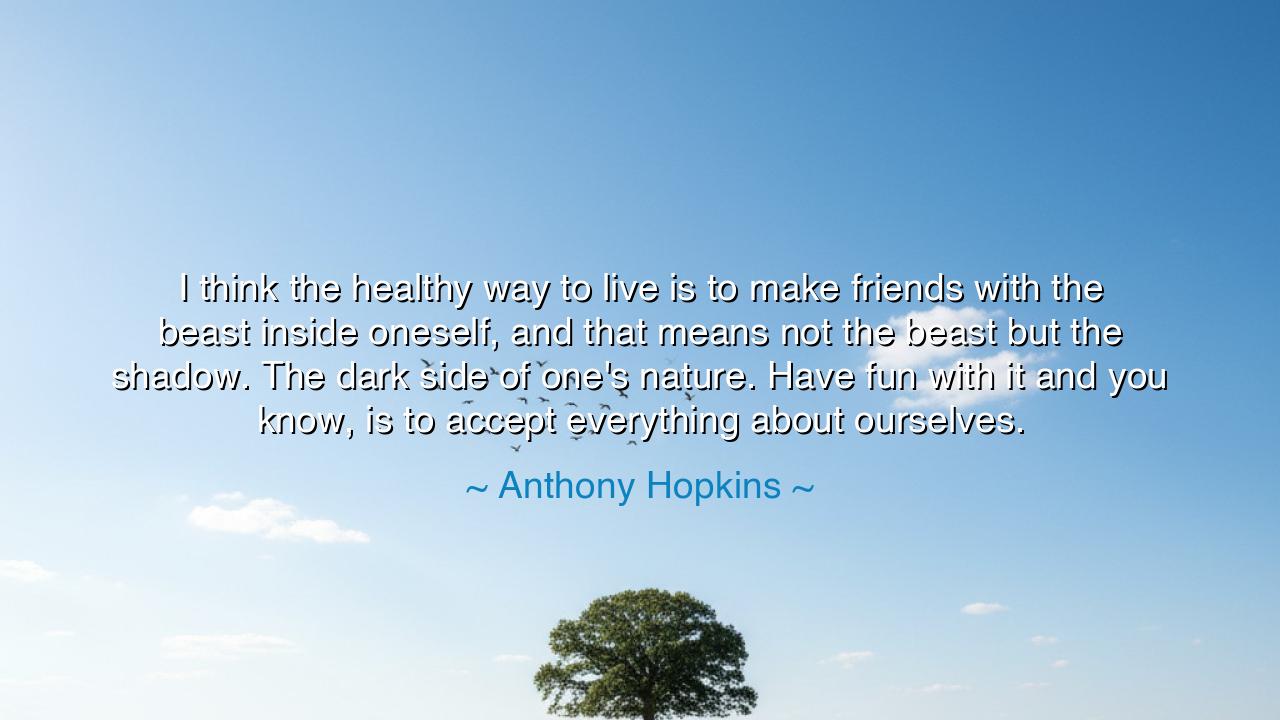
I think the healthy way to live is to make friends with the beast
I think the healthy way to live is to make friends with the beast inside oneself, and that means not the beast but the shadow. The dark side of one's nature. Have fun with it and you know, is to accept everything about ourselves.






“I think the healthy way to live is to make friends with the beast inside oneself, and that means not the beast but the shadow. The dark side of one's nature. Have fun with it and, you know, is to accept everything about ourselves.” Thus spoke Anthony Hopkins, the master of craft and reflection, whose art has long explored the hidden depths of the human soul. His words are not a mere actor’s musings, but a revelation of timeless wisdom — a truth the ancients knew well: that the path to wholeness does not lie in denying the darkness within us, but in understanding it, embracing it, and transforming it into strength. For the shadow is not our enemy; it is our teacher.
The origin of this truth stretches far before Hopkins’ time, back to the mysteries of the soul pondered by philosophers, mystics, and poets alike. The shadow, as named by Carl Jung, represents the buried part of the self — the instincts, desires, and fears that dwell beneath the surface of consciousness. Most people flee from it, ashamed of what they find there. They wish to be only light, only good, only pure. Yet, as Jung taught, “One does not become enlightened by imagining figures of light, but by making the darkness conscious.” Hopkins, in his modern eloquence, reminds us of this same eternal law: to live healthily, one must cease waging war against one’s own nature and instead make peace with it.
The ancients understood this as well. The Greeks told of Hercules, whose strength came not from denying his fury, but from mastering it. The warrior within him was fierce, wild, even dangerous — yet when directed toward noble purpose, his beast became his glory. The same is true for all mankind: the instincts we fear — our anger, our pride, our hunger — are not curses but powers misplaced. To “make friends with the beast,” as Hopkins says, is to reclaim that power, to look into the abyss of the shadow and find, not a monster, but a mirror.
This teaching finds its echo in Hopkins’ own life and art. Known for portraying darkness — most famously in his role as Hannibal Lecter — he has often spoken of finding peace by facing his own demons. He struggled with alcoholism in his youth, a beast that nearly consumed him. But rather than live in denial or shame, he confronted it, learned its language, and through that understanding found freedom. His triumph was not in pretending to be pure, but in integrating the broken and the beautiful parts of himself into one whole. From this journey came the wisdom of his words — that acceptance of the self, even its darkest parts, is the beginning of true health.
Yet many fear the shadow, for it reveals truths we would rather not see. It shows us our envy, our vanity, our violence, our weakness. To face it is to descend into the underworld of the soul, as Orpheus descended to rescue his beloved Eurydice. But just as Orpheus could not reclaim her without courage, so too must we enter our own depths if we are to reclaim our wholeness. To reject the shadow is to live half a life — to remain divided, constantly at war within ourselves. To accept it is to heal the split and awaken the unity that lies beneath all contradiction.
Hopkins also tells us to “have fun with it,” which is no small wisdom. For if we approach our darkness with fear, it grows; but if we meet it with curiosity, it begins to dissolve. Laughter, play, and creativity — these are the alchemies of the soul. The artist, the poet, the dreamer all know this: that what we repress becomes poison, but what we express becomes art. To live “healthily,” as Hopkins says, is to dance with our shadow, not to chain it. For the man who knows his darkness cannot be controlled by it; the one who denies it becomes its servant.
So, dear seeker, let this be your teaching: accept everything about yourself — the light and the dark, the gentle and the wild. Do not cast out your shadow, for it is part of your soul’s wholeness. Sit with it, learn its voice, and transform its power into wisdom. The beast within you, once feared, may become your guardian — your source of strength, compassion, and creativity.
Practical actions for the seeker: Each day, take time for reflection — not only upon your virtues, but upon your flaws. When anger stirs, do not suppress it blindly; ask what it seeks to protect. When envy rises, see what it reveals about your desires. Write your shadow upon the page, speak with it as with an old friend, and forgive it for being human. Practice compassion toward yourself, even for your imperfections. For when you accept your shadow, you cease to be divided — and as Anthony Hopkins teaches, you become whole, free, and deeply alive.






AAdministratorAdministrator
Welcome, honored guests. Please leave a comment, we will respond soon